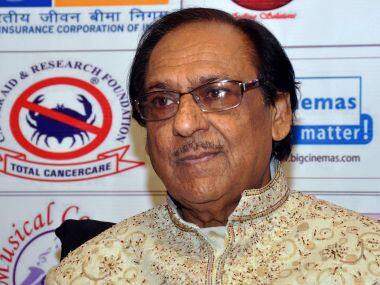So, Ghulam Ali can’t sing in India? While pondering this eventuality, I look at the collection of vinyl records on my table, the cassettes and CDs in the adjoining cabinet and the mp3 files on my mobile and laptop. There are Atif Aslam songs in them, so are Rahat and Nusrat Fateh Ali Khan, Salma Agha, Reshma, Noorjahan, Abida Parveen, Mehdi Hassan and, of course, Ghulam Ali. How many of them can the Shiv Sainiks and their supporters destroy? Just last night, like on numerous others, the local FM radio stations were jockeying with each other to play the maximum number of ghazals and qawallis from these great singers. How many radio and TV stations can they shut down? All of India — its Muslims, Hindus, Jains, Christians; the rich and the poor — listens to the mellifluous voices from across the border that make thousands of compositions memorable. Many of us listen to Ghulam Ali’s raat-din, and not chupke chupke, but with decibel levels turned high. [caption id=“attachment_2460758” align=“alignleft” width=“380”]  Ghazal maestro Ghulam Ali. AFP[/caption] How many of us can they stop? Even the Prime Minister listens to Ghulam Ali. Just a few months ago, the legendary singer performed at the Sankatmochan Temple — yes, a temple — in the PM’s constituency. The PM was invited to the event but he couldn’t attend. “I do wish I get the opportunity to attend such a programme in the future where so many well-known artists will be enchanting the audience,” he had tweeted his disappointment. “I must share that I have heard Ghulam Ali Sahab in the past that too in person,” he added.
Also read in the papers that Ghulam Ali Sahab wished that I attend the programme. Unfortunately, this time I would not be able to do so.
— Narendra Modi (@narendramodi) April 7, 2015
So, did we hear it right when the bigots screamed that listening to singers from Pakistan is “unpatriotic” and an act of “treason” while justifying the cancellation of Ghulam Ali’s concert in Mumbai? At the risk of sounding repetitive, it must be pointed out that art has no barrier, it is not a prisoner of religion or geography. It has to be kept away from politics of animosity, hatred and bigotry. Art is accepted, appreciated and assimilated in cultures not because it is prescribed by politicians or forced upon us by governments, but because it gives us joy and pleasure, satiates our mind, body and soul. Art is a personal bond between the exponent and his audience; it can be subjected only to the individual’s sense of quality and taste, not to the divisive agendas of politicians and their rabble-rousing cabals. If somebody tries to interfere, they should be told what Michael Jackson famously said when he grabbed his crotch and sang at Bal Thackeray’s invitation in Mumbai: just beat it. Using religion and geography as filters for art could lead to disastrous consequences. Should we, for instance, stop singing Saare Jahan Se Achcha just because it was written by Iqbal, the pioneer of the idea of Pakistan? Should we reject several famous bhajans because they were sung by Mohammad Rafi and composed by Naushad? Even the argument that stopping Pakistanis from performing in India will stop them from profiting financially, betrays their lack of understanding of market dynamics. Singers and artists get royalties for their work. Everytime a song is played on TV, radio or at a public event; whenever somebody buys a CD, a cassette or legally downloads a song, the singer gets paid. If the Sainiks are really keen on ensuring the singers do not get paid, they will have to knock on every Indian house to ensure they listen only to music made only in India. Can they? The real threat to Indian music, ironically, isn’t coming from across the border. Most of the singers from Pakistan are known for their finesse — nafast and nazakat — and cultural refinement of their work. Unlike the chaar-botal-vodka and g**#-main-dum-hai-to-band-karwalo type crudity of current Indian charttoppers, the qawaalis of Nusrat and ghazals of Ghulam Ali remind us the purity of art, the pristine joys of soulful music. Not allowing Ghulam Ali to sing in India — by the way, he sang for free at Sankatmochan Temple in Varanasi — will not make him poorer. But it will certainly deprive Indians of a treasure-trove of music. And the opportunity to remind us what music should be and what it has unfortunately become in the hands of some Indians.


)

)
)
)
)
)
)
)
)



